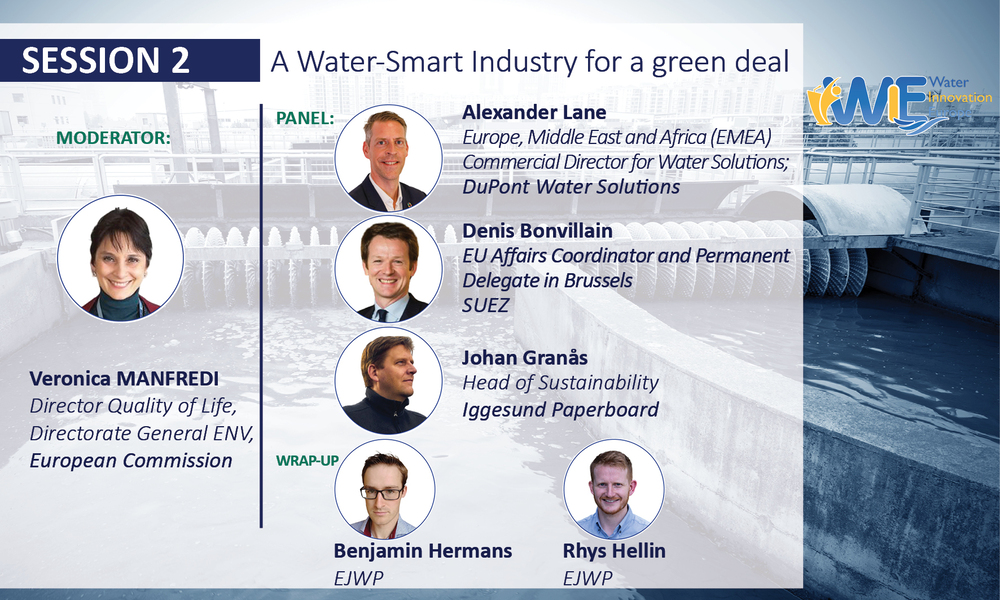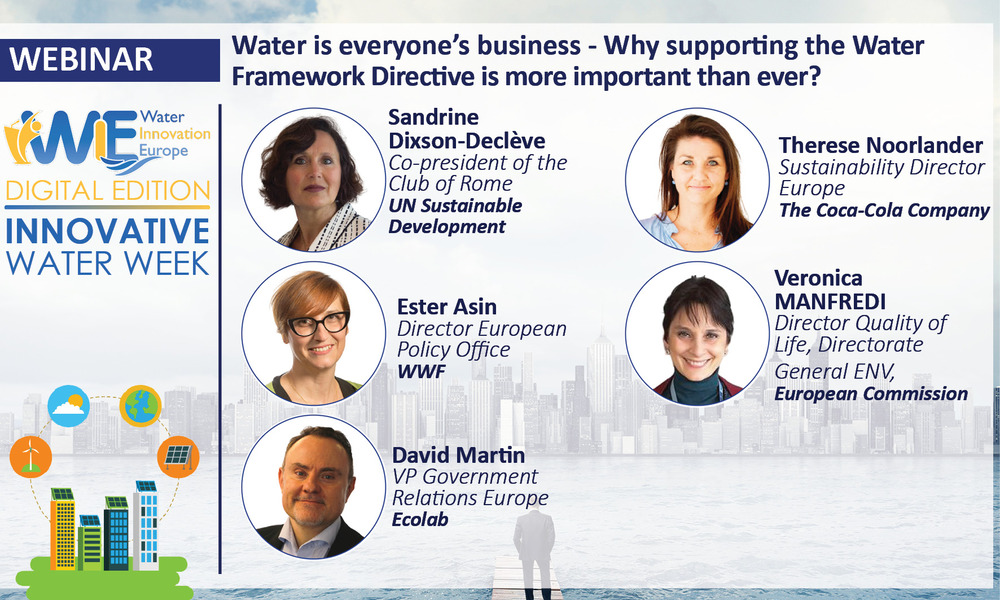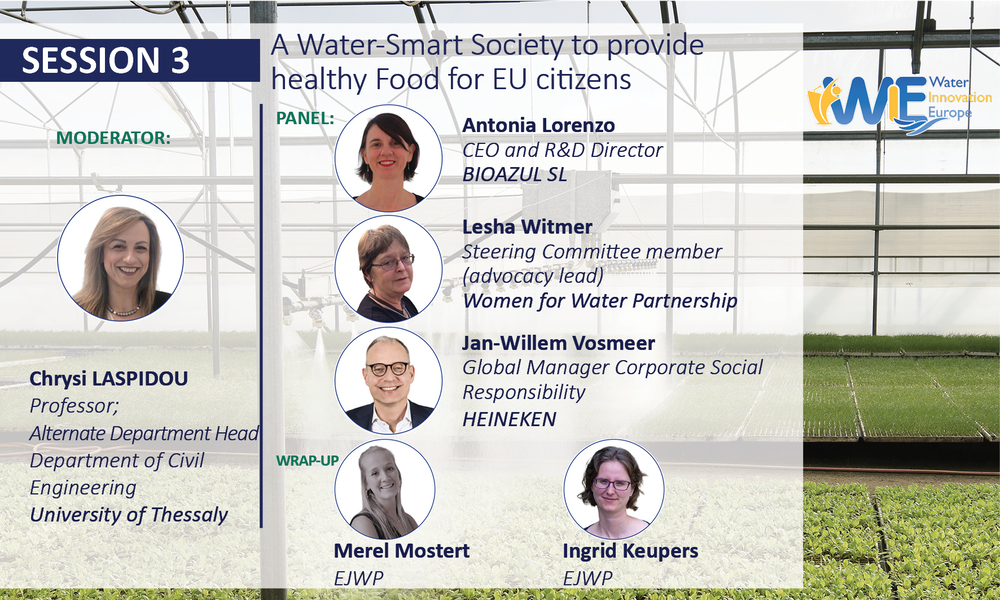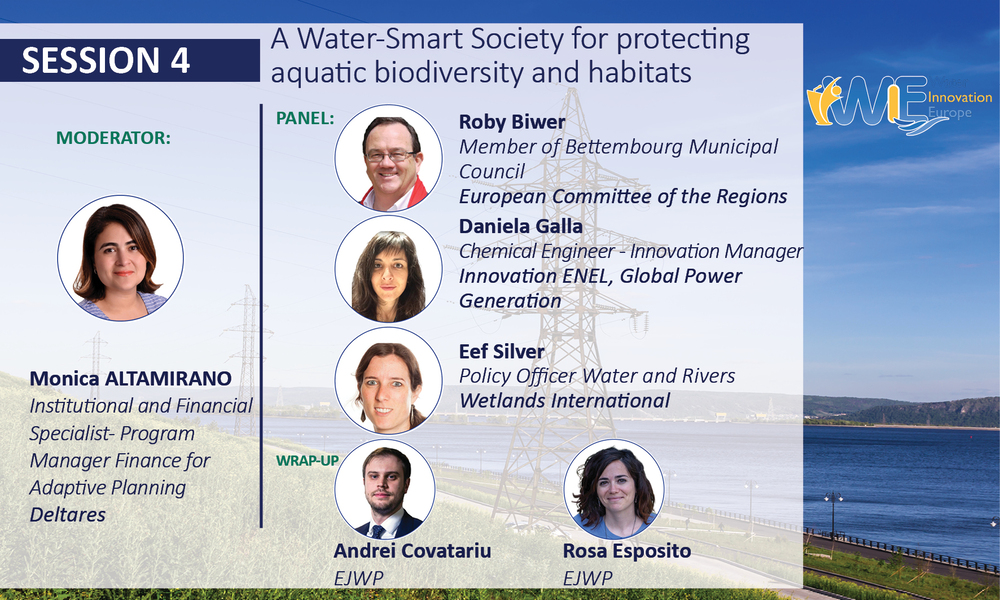SESSION 1: A Water-Smart Society for a successful Post COVID19 Recovery Plan


The COVID-19 is a wake-up call which stresses on how the European Union and its Member States are not well prepared for cross-boundary and cross-sectoral crises. Therefore, Europe must be smart in its reply. It means Europe must not only focus on curative solutions but also preventive ones to achieve a sustainable Europe which can be resilient through risk management, prevention and mitigation of crisis.
Water knows no borders and it is an asset for Europe. We can use water as the enabler to reboot and accelerate the recovery of our society thanks to its interactions with the all other sectors. As part of our natural and cultural heritage, water is not only a question of resource availability but also a matter of opportunities and resilience through its links with climate, infrastructure, digitalisation, biodiversity, food, tourism, transport, trade or energy. Globally, more than 3 out of 4 jobs depend on the supply of sufficient water.
Moreover, investing in the water sector Europe contribute to create sustainable growth and green jobs with a high return on investments in every sector of our society and maintain Europe united. The European Union has already several solutions that need simply to be up-scaled, but additional ones require new collective efforts in line with the key EU priorities - Green Deal and the Digitalisation of Europe - and its international obligations such as the SDGs and Paris Agreement.
_____________________________________________________________________________
Session 2: A Water-Smart Industry for a green deal

Mobilizing the industry for a clean and circular economy will require to transform our industry to encourage energy & water efficiency and reuse as much as possible materials before recycling them. The EU wants to focus on resource-intensive sector such as textiles, construction, electronics and plastics. If the waste reduction is mainly focusing on over-packing, reuse of our resources, particularly water, becomes a challengeable priority to achieve a climate-neutral Europe.
All those industries are large water consumers and must consider the value in water. Water industry has already opened new rooms for reduce water consumption : reuse water, investment to reduce leakages such as digitization. However, Europe should continue to support R&D&I and the transformation of our industry through an ambitious taxonomy and continue to revise legislation such as the Industrial emissions directive. As new opportunities to support water-related actors in their research and innovations, Horizon-Europe and the revision of the water reuse regulation are key to go several steps further to set a circular economy with energy and water efficiency. These new opportunities are key to also support investment in human capital and the creation of sustainable jobs in Europe.
_____________________________________________________________________________
WEBINAR: Presentation of the WE Water Vision implementation 2020-2027
- Durk KROL - Executive Director; Water Europe
- Andrea RUBINI - Director of Operations ; Water Europe
The more recent political guidelines of the European Commission for the period 2019 to 2024 identify new, challenging priorities and changes for a future, more wealthy Europe. The EC clearly states that Europe must lead the transition to a climate-neutral and healthy planet and a new digital World. The two most important frameworks “The European Green Deal” and “A Europe fit for the digital age” represent the effort that society must make in order to move towards a greener Europe supported by a more integrated approach to the establishment of a digital society. Furthermore, it is now clear that lessons must be learnt as a result of the COVID-19 crisis in order to foster an increased European preparedness and level of resilience to possible future events.
This document, developed with contributions from Water Europe members and external stakeholders outlines how the WE Vision and the SIRA address the aforementioned European strategies and policies, as well as considering the future European Horizon Europe Framework Programme for R&I.
_____________________________________________________________________________WEBINAR: Water is everyone's business - Why supporting the Water Framework Directive is more important than ever?

Water is everyone’s Business. The more recent UN Water report underlines once again that European society is facing pressing challenges regarding both water quantity and quality with direct impact on environment, people and business. Consistent with their societal values 27 businesses released a manifesto to urge the EU governments and the European Commission to preserve the high standards set by the Water Framework Directive (WFD).This Directive is the key law legal framework ensuring that freshwater ecosystems in Europe are protected and restored and water is sustainably managed, contributing to the attainment of the Sustainable Development Goals. To contribute to a Green Recovery and maintain European credibility globally the WFD legal requirements should not be weakened and its objectives need to be met by helping national actors to fill the implementation gaps.Businesses set up different initiatives that could be scaled up and disseminate across Europe. Broader and more inclusive collaboration with local authorities, citizens civil society stakeholders, is therefore needed to reach and exceed the targets of the Water framework Directive.
_____________________________________________________________________________
Session 3: A Water-Smart Society to provide healthy Food for EU citizens

Becoming the new international standard for sustainable food is not possible without considering water in agriculture. Diffuse agricultural pollution poses significant pressure on 38% of the EU water bodies. Mitigate extreme climate change and reduce over-abstraction of water are also key priorities to secure healthy and affordable food in Europe.
The farm to fork strategy will drive innovate agribusiness value chains and is hence an opportunity to create structural alternative to water over-consumption and the discharge of nutrients to water bodies. I will foster hence to monitor and plan water consumption and pollution to reduce the agriculture water footprint though more effective irrigation and agriculture, as well as raising users 'awareness. Innovation is a powerful element to create and settle new innovative tools to consider the water-food nexus. How water can contribute to secure food production?
_____________________________________________________________________________
Session 4: A Water-Smart Society for protecting aquatic biodiversity and habitats

How can we conjugate protection and restoration of biodiversity with human activities? The biodiversity 2030 strategy aims to protect and restore biodiversity. Water management plays an essential role in this, as the main threat on inland water quality. Freshwater species have declined by 83% since 1970. The decline of aquatic biodiversity is twice more than the one observed in terrestrial and marine species. Despite the efforts, there is still a long way to go to protect and restore all European waters by 2027, as mandated by the EU’s Water Framework Directive. Only 40% of European inland water are currently healthy and fully provide the ecosystem services we all depend on.
Additionally, our cities are facing more frequently water-related extreme events such as floods and droughts. It becomes a necessity to make our society resilient by developing hybrid infrastructure. Wetlands and other ecosystems in combination with smart water technology can offer a large panel of innovative solutions to achieve a water smart society.
Investments is the nerve to protect and restore our natural capital. However we need to go beyond. With the full support from the EU institutions, R&I has a key role to play by enhancing the benefits to all from biodiversity and ecosystem services by investing in nature based solution, and artificial intelligence in water technology. A society without consideration for ecosystems and biodiversity cannot be a smart water society, which fully embraces its societal responsibility.
_____________________________________________________________________________
Session 5: A Water-Smart Society for excellent quality of water


Monitor, prevent and remedy are the key actions to eliminate as much as possible pollution to improve our quality of life (water, soil, air). This new strategy of the European Commission aims to restore the natural functions of ground and surface water, particularly the pollution from urban areas such as runoffs, floods to improve our health. Shipping transport is also a source of pollution that our society should include in this strategy. Therefore, how considering the value in water can support the zero-pollution strategy of the European Commission?
Innovative technological treatments, including digital solutions, are therefore the core solutions to reach these targets and tackle pollution at source. This is also an opportunity to go steps further by fully exploiting the value in water, extracting and valorising energy and substances which are embedded in water streams : plastics, nutriments, metals…. Research and innovation in the water sector contributes to the creation of a Water Smart Society with a potential to reduce drastically pollution in soil and ensuring appropriate recharging of natural water reserves.
___________________________________________________________________________
WEBINAR: Disclosure - a critical foundation for smart water management

Transparency of water-related risks and opportunities is the foundation for driving the urgent action demanded by science and the EU’s long-term ambitions. The EU corporate reporting framework and sustainable finance agenda play a vital role in driving the transition to Water Smart society which fully considers water security. This is reflected in the common position on the post COVID19 recovery plan
signed by CDP Europe, Water Europe, Netwerch H2O and the Youth Parliament for Water. CDP Global Water Report 2019 analyses the data disclosed through CDP by 2.433 companies in 2019. It finds that companies are not doing enough to tackle water pollution - and reveals the tangible business case for immediate action. Investor signatories of CDP’s Capital Markets team call for corporate disclosure on water issues, providing them, in return, with data to identify value at risks. Although a growing number of investors are looking at water-related issues, much more needs to be done to achieve a water secure world.
- Nadya Dedikova - Public Affairs Officer; CDP
- Andreas Svennefjord - Account Manager Reporter Services; CDP
- Jerome Taraska - Account Manager Capital Markets Engagement; CDP














































